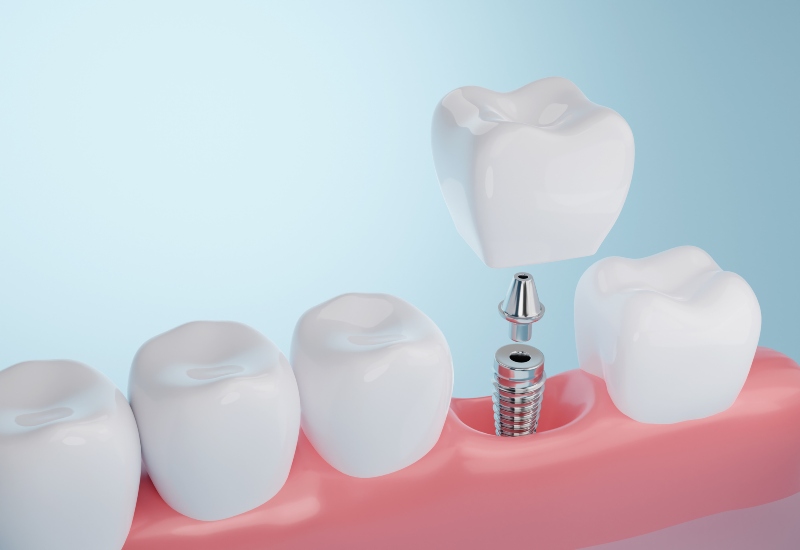Your Guide to Choosing the Right Type of Dental Implant
Germantown Advanced Dentistry helps patients understand how to choose the right type of dental implant for their needs. Dental implants are at the forefront of modern dentistry for restoring smiles and regaining confidence. This guide will take you through everything you need to know about dental implants, from what they are and how they work to the types available, their procedures, and the recovery process. If you’re considering dental implants, we’ll help you make an informed decision and choose the most effective option for you.

What Are Dental Implants?
Dental implants are artificial tooth roots created to provide a permanent base for fixed or removable replacement teeth. Made from biocompatible materials like titanium, implants naturally integrate with the jawbone to create a strong and stable foundation. They are a long-term solution for individuals who have lost one or more teeth due to injury, decay, or periodontal disease.
How Do Dental Implants Work?
Dental implants work by fusing with the bone in a process called osseointegration. We place the implant post into the jawbone. Over several weeks to months, the bone bonds with the implant, creating a durable anchor. A custom-made crown, bridge, or denture is then attached to the implant, restoring the functionality and aesthetics to the smile.
Main Types and Categories of Dental Implants
Understanding the types of dental implants is essential in determining which works best for your situation. The main categories of dental implants include:
- Endosteal Implants: Endosteal implants are the most common type. They are placed directly into the jawbone and are shaped like small screws. These implants are ideal for patients with sufficient bone density.
- Subperiosteal Implants: Subperiosteal implants are positioned under the gum but above the jawbone. These are often used for patients who lack enough healthy bone and are unsuitable for a bone graft.
- Zygomatic Implants: These longer implants, which are anchored in the cheekbone (zygoma) rather than the jawbone, are typically recommended for patients with significant bone loss.
- Mini Dental Implants: Smaller in diameter, mini implants are less invasive and are often used to secure dentures or replace smaller teeth.
How to Choose the Right Implant
Consulting with our experienced dental professional is crucial in choosing the right dental implant. We consider your oral health, bone density, budget, and personal goals. Our team will assess your specific case and recommend the most suitable type based on X-rays, scans, and comprehensive assessments. Factors to consider include implant longevity, esthetics, and the time commitment for the procedure. Explore all your dental implant options and prioritize the solution that aligns with your needs.
Benefits of Choosing the Right Implant Type
Selecting the dental implant type that fits your lifestyle and dental health offers numerous benefits, such as improved comfort, enhanced chewing ability, and the prevention of bone loss. A properly chosen implant also ensures longevity and a more natural appearance, boosting your overall quality of life. The right decision can minimize complications and result in a smooth recovery process.
Dental Implant Procedures by Type
The exact procedure for dental implants varies depending on the implant type. Our dental team guides you through the dental implant process steps to ensure a safe and effective procedure tailored to your dental needs. Here’s a brief overview:
- Endosteal Implants require an initial implant placement into the jawbone, followed by a healing period before the crown is attached.
- Subperiosteal Implants involve creating a gum incision to position the implant frame, suitable for patients unable to undergo bone enhancement.
- Zygomatic Implants are more complex and require specialized training but are ideal for advanced bone loss cases.
- Mini Implants are placed in a single appointment, making them a quicker, less invasive choice.
Recovery, Healing, and What to Expect
Careful aftercare, including maintaining good oral hygiene, avoiding hard foods, and following your dentist’s instructions, will speed up recovery and ensure successful results. Many patients experience mild discomfort during recovery, including swelling, minor bleeding, or soreness around the area. Most of these symptoms subside within a few days, and patients can return to normal activities soon after. The complete healing process for the implant to fuse with the bone (osseointegration) can take up to several months, depending on the individual.
Pros, Cons, and Risks by Implant Type
While dental implants boast numerous advantages, it’s important to be aware of the pros, cons, and risks. The pros of dental implants include:
- Natural appearance and feel
- Long-lasting results
- Prevents bone loss
- Improves oral health and functionality
Some potential cons of dental implants include:
- Lengthy healing process
- Higher cost compared to other restorative options
- Possible need for additional procedures, such as bone grafting
Some risks of dental implants may include:
- Implant failure
- Infection
- Nerve or sinus complications
Contact Germantown Advanced Dentistry
Germantown Advanced Dentistry provides comprehensive dental services to our patients. Whether you need a single implant or a full-mouth restoration, choosing the correct type and relying on skilled professionals will make all the difference. Let us help improve your smile and confidence. Contact us today to schedule an appointment.
Frequently Asked Questions
- Are dental implants painful? Due to local anesthesia, the procedure itself is typically painless. Minor discomfort during recovery is normal and manageable with prescribed medication.
- Can anyone get dental implants? Most adults with good oral health and sufficient bone density are candidates for implants. Certain conditions, like uncontrolled diabetes or heavy smoking, may affect candidacy.
- How long do dental implants last? Dental implants are designed and customized to last a lifetime. We recommend regular dental checkups and a positive oral hygiene routine.
Are dental implants covered by insurance? Coverage varies depending on your insurance plan. We advise speaking with your provider to understand your benefits.
